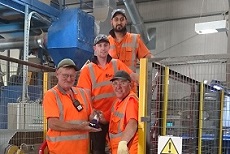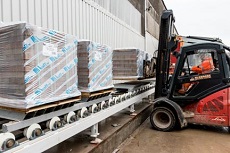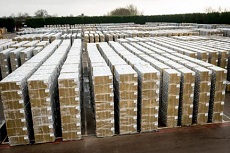Team Effort Wins Precast Safety Award for Brett Landscaping
Brett Landscaping wins Best Practice Award at the British Precast Concrete Federation
Safety modifications to the block and flag paving texturing line at its Barrow-upon-Soar site have earned Brett Landscaping & Building Products a prestigious Best Practice Award at this year’s British Precast Concrete Federation annual award ceremony, where the company won the Health & Safety category for member companies with 250 or more employees.
Brett Landscaping and Building Products manufactures block pavers, hydraulically pressed paving flags and precast kerbs at its Barrow-upon-Soar site. Certain products undergo a texturing process which uses a shot-blaster as part of a secondary processing line which operates 24 hours a day, five days a week. The process employs one vacuum-head robot to pick up blocks and flags from pallets and place them on the line to feed into the shot-blasting unit and a second robot to pick up finished products after shot-blasting and stack them onto pallets for collection. Scrap products are separated out and placed in a skip.
The award-winning project saw extensive modifications to the shot-blasting line that dramatically reduced the health and safety risks for operators as well as improving efficiency and output - thanks to the marked reduction in human intervention required within the process.
Peter Richardson, Performance Manager at the Barrow site explains: “The original process had the first robot emptying and stacking ten pallets at the feed end of the production line within the safeguarding enclosure. Each time ten pallets were stacked up, the line had to be halted while operatives entered the enclosure with a fork lift truck, picked up the stack of pallets, exited the enclosure, then re-entered the enclosure at the discharge end, where the pallets were needed for the second robot to stack the finished product.
"At busy times, this could happen up to ten times in a 12-hour shift, involving two people and a fork lift truck each time. These interventions carried risks associated with pallet stacks and diesel fumes in the building. They also slowed the production line.
“Following a review by people from our operators and maintenance teams, it was decided that a pallet transfer conveyor would be installed to move individual pallets directly from the feed end to the discharge end of the line. The robots were re-programmed to accommodate the changes and the outcome has been highly successful, dramatically reducing operative intervention and the associated halting of the production line.”
The new pallet transfer conveyor has reduced the number of enclosure accesses by 88% to 21 over a 30-day period compared to 178 before the modifications were made – vastly reducing vehicle movements in the factory as well as the risk to operatives.
A further safety risk was also identified and addressed. With the original process, not all defective products could be automatically ejected by the robotic system – some had to be removed by an operative and placed in a skip which could involve heavy lifting and twisting within the enclosed robotic area.
A new belt conveyor has now been installed to take scrap products to a skip outside the guarded area, reducing the need for operatives to enter the enclosure. A set of gently angled rollers has also been installed to allow operators to place scrap product on to the belt conveyor without twisting or over-reaching.
“The scrap conveyor has greatly reduced the need for operatives to use fork lift trucks in the guarded area, reducing the risk of damage or injury and the free-rolling assembly next to the operator further reduces manual handling requirements,” says Peter. “Interventions at the scrap gate have reduced from 137 over a 30-day period to 65 – a 52% reduction.”
These modifications cost around £20,000 to implement, but the productivity improvements they have provided are expected to recoup this investment within two years.
“Health and safety are paramount at Brett Landscaping,” says Site Manager, James Jeffcott. “As a team, we regularly review processes and procedures across the Barrow site, identifying where risks can be reduced and safety improved. The impact of the modifications to the shot-blasting process have benefitted everyone involved and we are delighted to receive the BPCF award in recognition of the improvements achieved by the teams on site.”






